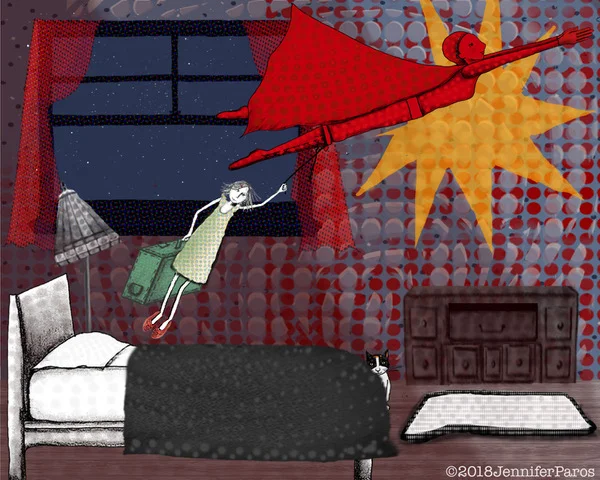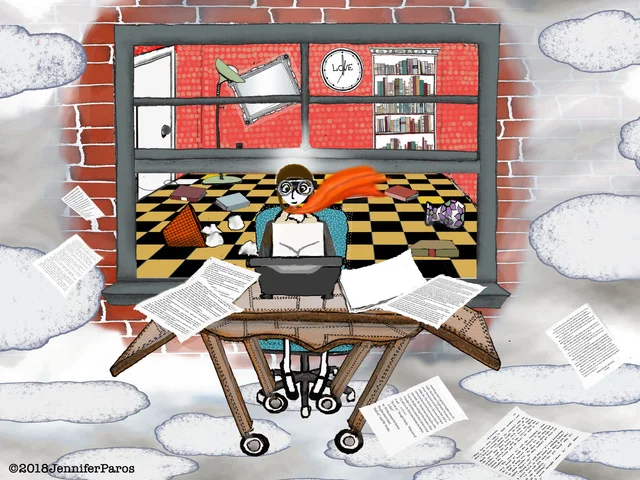Good Company: Embracing the Process and Doing What You Love
Many years ago, in my college days, I dreamt of a woman dressed superhero-style in red from head to toe with a big flowing cape. She burst up from the ocean in one awe-inspiring moment, a symbol of power and strength. At the time I did not relate much to power and strength – I saw myself as a small but good and intelligent entity with varying capabilities, positive and not so positive qualities. I certainly didn’t see myself backed and uplifted by an erupting force of energy. To me I was occasionally wobbly, and generally less confident in the world than I wanted to be. When I first arrived at college, I developed some agoraphobic inclinations and worked through a great deal of that fear-of-getting-out-therestuff, though remnants of that frame of mind could still get stirred up.
At that time I didn’t own a car and was sometimes dependent on Greyhound to transport me home for the holidays. The Greyhoundbus station however was not just worn, neglected, and mostly unclean; in my eyes it seemed seedy and potentially unsafe. So I didn’t want to go there alone. But eventually life provided circumstances in which I pretty much had to. I was in a bind: my desire was to make the trip, but I didn’t want to feel so frightened along the way.
Read More
More Than Regional Differences
I once told a Seattle visitor that he had picked a good day to come here because all the mountains were out. He looked at me and asked what we said about them when they weren’t out. Did we say they were “in”? I told him we didn’t talk about them then. There are many regional sayings like that. A friend from Alabama was always “fixin’ to do” something. And everyone has heard a Southerner say “y’all” or someone from Boston say he went to “Havahd.”
These regional pronunciations and expressions are useful to movie producers who need to use dialogue to establish a character’s background. But mispronunciations that are not confined to a region may come across as mistakes or lead to misspelling or wrong word choices in your writing. There are many, but these are some common errors that you should be sure you aren’t guilty of.
Read More
Flannery O’Connor: Lupus Warrior
The works of Flannery O’Connor can be found in almost any library. Hailed as one of America’s greatest fiction writers, her works – including such notable pieces as A Good Man is Hard to Find, Wise Blood, and Everything that Rises Must Converge– line the shelves in any self-respecting book collection. The work of this southern gothic writer has been captivating people for decades. Even readers who don't particularly enjoy her writing would be surprised to learn this one remarkable fact about Flannery O'Connor: she wrote some of her best works while fighting lupus, a debilitating inflammatory disease. This battle would shape her faith, her writing, and her life– and ultimately end it all.
O’Connor grew up in Savannah, Georgia, quite literally beneath the shadow of the Catholic church. When I visited her childhood home one cool September day– my legs tingling with nerve pain from my own long-term health problems– I saw her cradle in an upstairs bedroom; the steeple from St. John’s Cathedral across the square filled the window above it. I was shown the bathtub where she used to gather her friends and read Grimm’s Fairy Tales to them, which would send them home terrified, producing irate parents coming back later on. I learned how her faith and her worldview shaped her writing, and I realized what a blow it must have been to both of those to be diagnosed with such a terrible disease so young.
Read More
Building a Book
"Have I taught you nothing?"
That's what my best friend asked me when I told her that my husband and I had decided to build a house. Her family had recently survived their own construction chaos, and because they lived in a distant zip code, she had shared her travails with me in our almost-daily emails. After I'd been a digital witness to her seemingly endless ordeal, how could I consider stepping into the same excavated pit?
Read More
Take a Number
Just as the difference between fewer and less continues to confound people, so does the difference between this kind and these kinds.
Read More
The Desire to Be Done: Resisting and Creating
I’ve been in a funk lately. I entered it unwittingly and have had trouble finding the exit, and when I do, difficulty remembering where it is. I don’t like to use the word depression, which makes me feel blanketed – as though it’s wall-to-wall sorrow. There are always corners and areas where all is clear.
Read More
Confidence And Clarity: Bringing Ourselves Into Focus
I’ve been in a funk lately. I entered it unwittingly and have had trouble finding the exit, and when I do, difficulty remembering where it is. I don’t like to use the word depression, which makes me feel blanketed – as though it’s wall-to-wall sorrow. There are always corners and areas where all is clear.
The other day, I was rooting around my work area and opened a drawer mostly forgotten. Inside was a large envelope filled with letters from about three decades ago. They were from friends – some with whom I’m no longer in touch, some with whom I still have contact, some with whom I remain close. As I read, the letters helped me spot those clear areas in me. The letters, at least for that moment, helped me remember.
We often focus on remembering. We like to remember the good: special occasions, landmarks, graduations, birthdays, vacations; and we also choose to ruminate on what feels bad, what we consider failures, betrayals, scary things, and pain. We tag these groups with either like (good) or dislike (bad).
Read More
How Many of This Do You Want?
Just as the difference between fewer and less continues to confound people, so does the difference between this kind and these kinds.
- “Fewer” deals with things that can be counted: You should have fewer responsibilities around here after that mess.
“Less” deals with volume: There is less water in the pond this year.
The trouble comes when that difference is not recognized, and people carelessly say “There’s less kids in the class this year.”
The same singular/plural situation arises when designating one item versus a number of items.
- Do you want more of this chocolate?
- Do you want more of these chocolates?
You often read about “these kind of vegetables,” instead of either “these kinds” or “this kind.” It’s the kind vs. kinds that confuse.
Read More
Bummer – Rejected Again
Okay, I thought of a few, coarser words to use in the title instead of “bummer” but really, do you need to have those in your head? You’ve probably said them enough already and with force because – well – who the deuce likes rejection? In addition, upon receiving the “u” word (“unfortunately”) from that editor last week, you may have resorted to kicking things like a two-year-old whose snotty little cousin just ate the last tater tot. One of my favorite rejections was from an editor who stated that, even though they enjoyed reading my story, they were going to “free it up” for another publisher to use. Seriously? I said more than “bummer” for that one.
Listen, we all kick and curse and shake our fists at the unfair universe. And then we settle into the second stage of rejection grief and feel sorry for ourselves, glare out the window, and boo-hoo-hoo. And if, in the throes, you’ve got your hand across your forehead and a cigarette dangling from your other hand, going all Sylvia Plath on everybody, I want you to do something. Snap out of it. You are in such good company, it’s ridiculous. I mean, think of all the editors who looked at Harry Potter, called it “bloody rubbish,” and gave it a toss.
Read More







